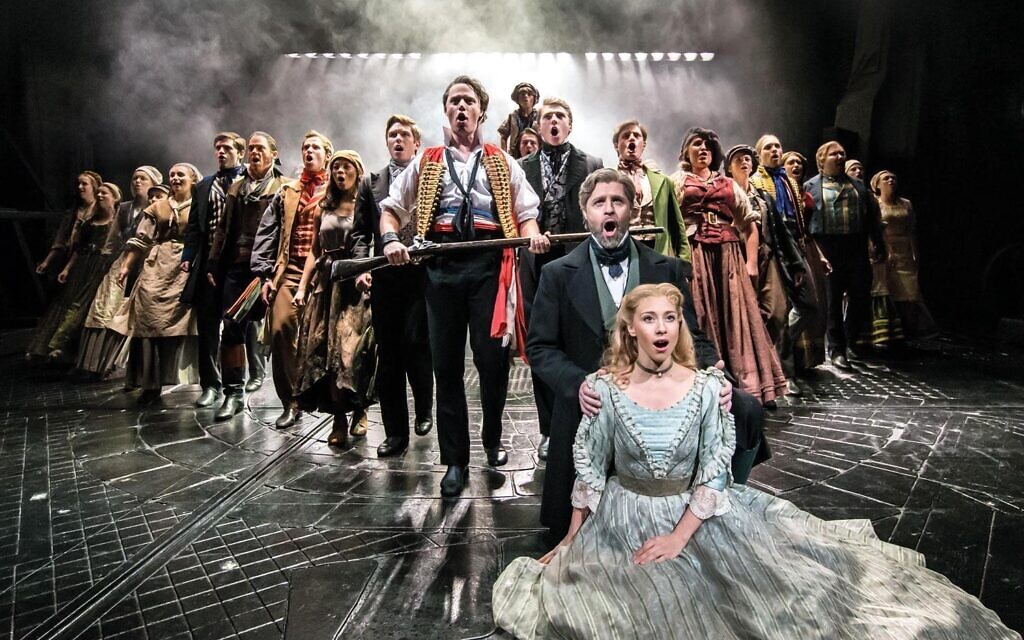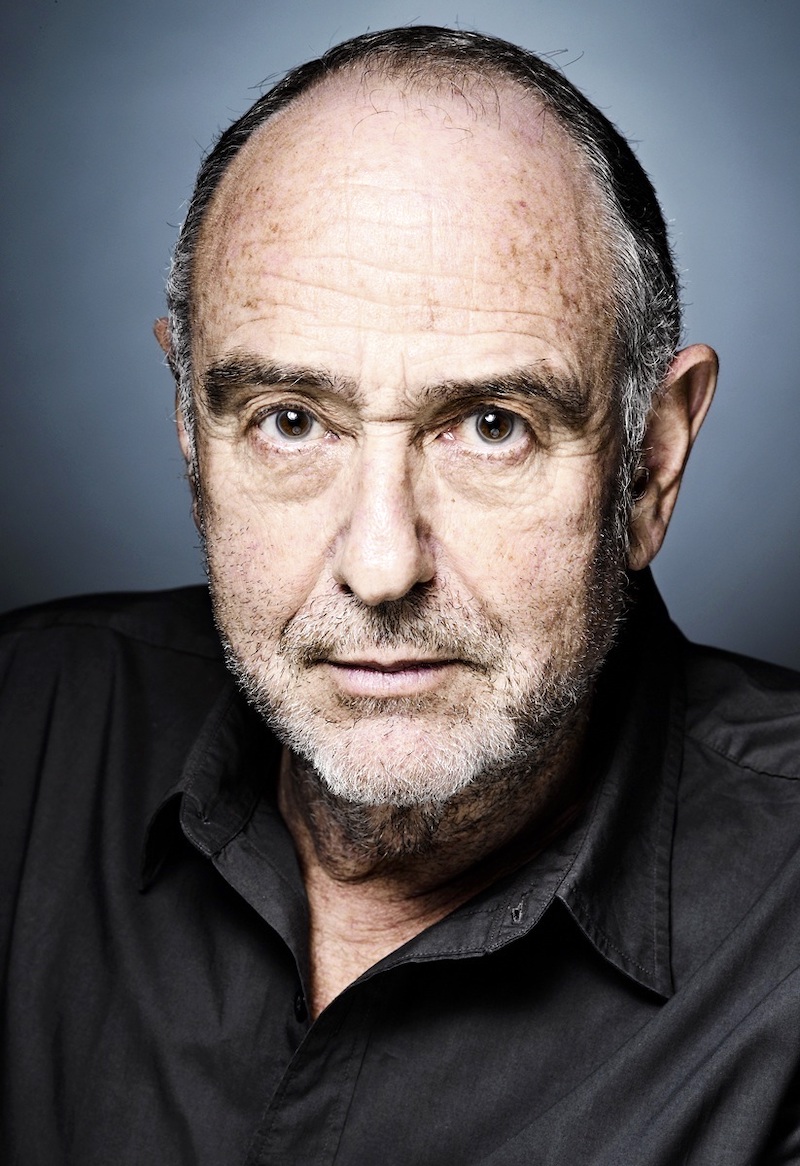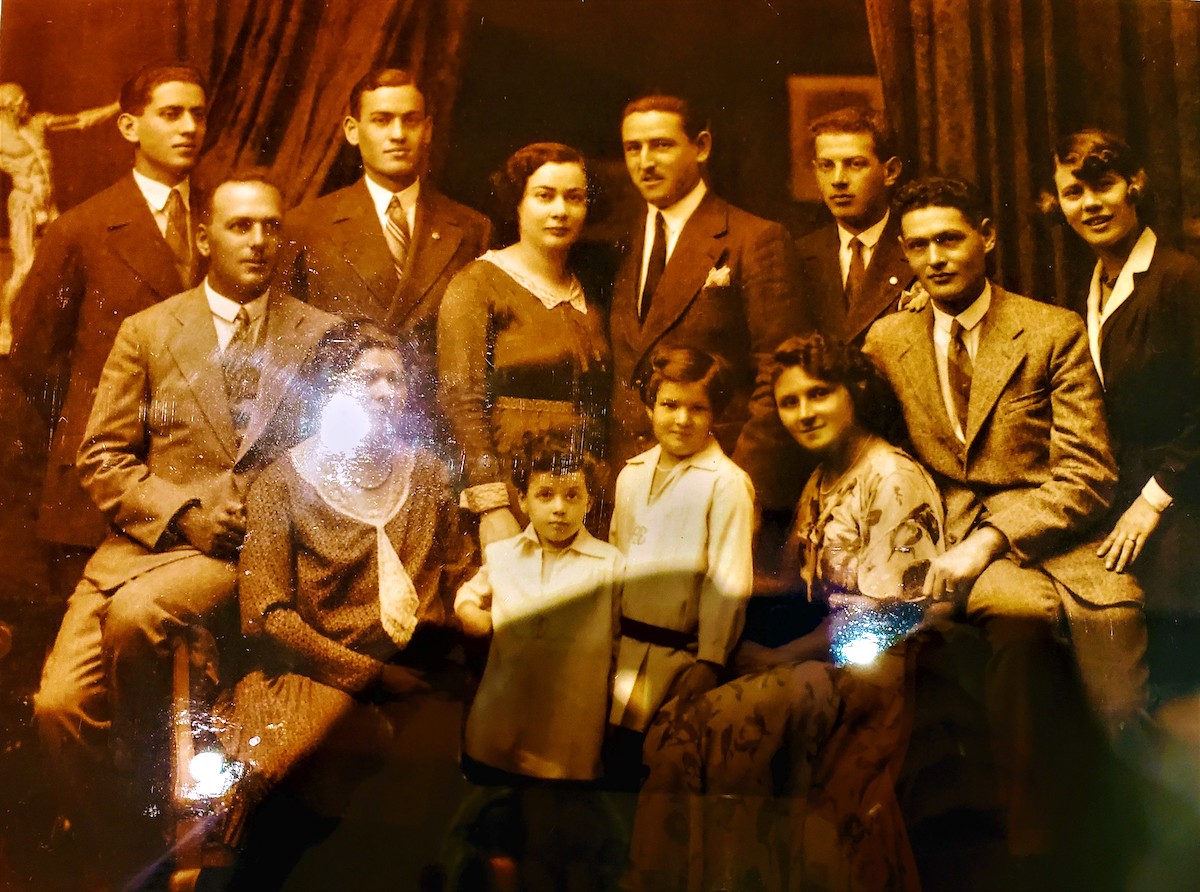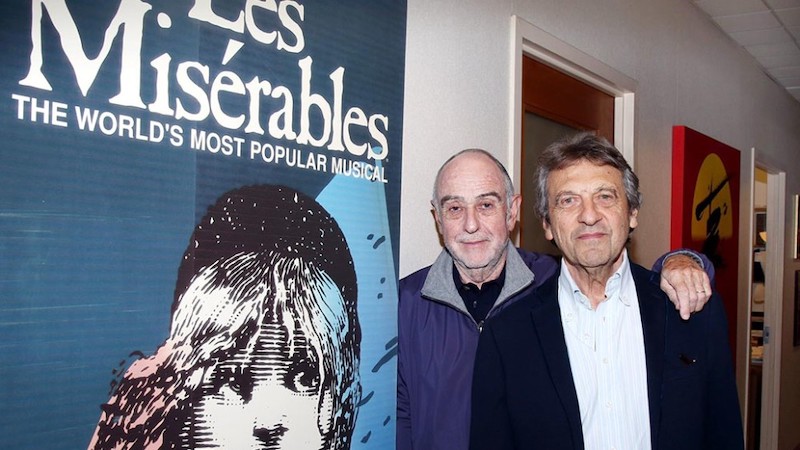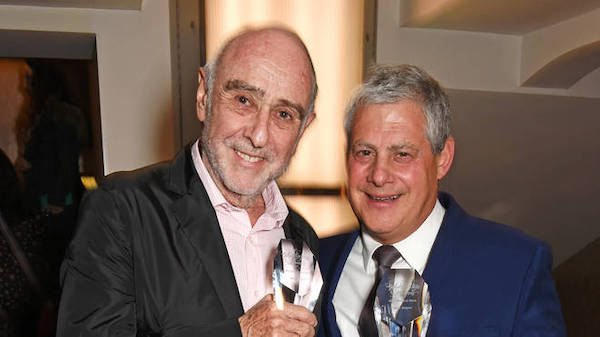‘When I write a show, there’s always a part that is Jewish’
Ahead of Yom HaShoah, Les Miserables composer Claude-Michel Schönberg talks exclusively to Brigit Grant about his family’s Holocaust experience
It’s impossible to meet Claude-Michel Schönberg and not shower him with compliments.
Short of declaring undying love and admiration, I am part of that devoted Les Miserables following which has been growing since the show opened in 1985.
That a Jewish duo – French composer Schönberg and Tunisian lyricist Alain Boublil – are the geniuses behind this enduring musical is a bonus and seeing it again recently confirms its emotional hold. This has also proved the case in lockdown with Les Mis songs being turned into Covid anthems .
Get The Jewish News Daily Edition by email and never miss our top stories Free Sign Up
Schönberg, never imagined his music would be used in such a way, but at 75, he modestly attributes the magnificence of ‘Les Mis’ to the people now in charge: “We have a wonderful team maintaining it and I’m not looking after it anymore.”
Schönberg, who with Boublil also created Miss Saigon and Martin Guerre, is so self-effacing he credits the cast and not himself for the show’s abiding appeal, stating: “It was never a struggle for me to write music. I was born with this. It is easier for me than talking.”
Sadly the show like every other West End production in the West End and across the country is currently just a title on a marquee hoarding. With all theatres closed and large group gatherings on indefinite hold, fans can only ‘dream a dream’ of seeing a live performance.
Schönberg was due to give a talk at JW3 days before the Prime Minister gave the isolation orders and those with tickets lost the chance to hear about his past as a pop singer in Paris in the 70s, an EMI producer and then teaming up with Boublil to adapt Victor Hugo’s French Revolution tome. “JW3 will happen,” a quietly optimistic Schönberg told me as he prepared to virtually teach his students at the Royal Academy of Music.
But for now with the musical melodrama on hold, he has a story for Yom Hashoah that is steeped in the tragedy of the Holocaust.
It is the story of the people in the group photo that hangs on the wall in his office.
Taken in Hungary in the 1930s, it is an image of family unity and contentment.
“But divide the photo in half and everyone you see on the left died in Auschwitz,” says Schönberg.
He delivers this fact like the beat of a drum and it reverberates with sorrow.
Schönberg knew from a young age that his relatives were among the 437,000 Hungarian Jews who were gassed at the camp and that his smiling grandmother in the photo died in the Budapest ghetto at the end of the war.
It is the family he will never know, but still thinks about.
“My parents left Hungary before, thank God, as my father was unhappy with the politics and was struck by a sword during a cavalry charge at a mass labour protest.
“He had the mark on his shoulder all his life, but he felt living in a country where the army attacks its own people was not a good place to live.”
Hungary was also anti-Semitic, so Doli Schönberg and his wife Juci accepted an invitation from a cousin to move to Paris, eventually settling in Vannes, the capital of Morbihan in Britanny.
Leaving the prejudice in one country only to face the German invasion of their adopted homeland posed a horrific threat for the couple.
Fortunately the local community stepped up to protect them.
“Vannes’ administration became part of the resistance and my parents were given fake birth certificates confirming them as Catholic. Even the priest helped.”
Laced with more drama than any story he could score, Schönberg knows the personal risks the citizens took, but Doli took risks of his own.
An accountant by profession, he was unable to understand the French system and became a piano tuner with authority from the Germans to tune keyboards in harbour homes by the sea.
Access to this heavily controlled zone resulted in Doli being approached by the resistance to deliver papers and information and on one occasion two guns that were in the attaché case for his tools.
“Leaving an officer’s home, he was arrested by two soldiers who wanted to know why he was there and what was in his bag. Luckily, the German officer explained my father had tuned his piano and they let him go, but it was frightening.”
Schönberg says that his father never spoke about those years under occupation or his Judaism.
“We were the only Jews in Vannes and the key words were always integration and low profile.
“They couldn’t be outwardly Jewish, there was no synagogue and after I was born, a month after D Day, they were always worried. They knew who had won, but didn’t know if it would happen again.”
The only clue to the family’s faith was the arrival in 1946 of a cousin who had survived Auschwitz.
“She came to live with us for two years and then went back to Hungary, because she was homesick. In all that time she didn’t speak a lot, but I still remember the number on her arm.”
Schönberg’s recollections of his childhood are as visually emotive as his music and he describes the kindly neighbours and friends who loved the atmosphere in his family home.
“There was always a Hungarian lunch and Hungarian cake and they loved it. When my mother died in 1978, many of them I had not seen for ages came to see me to tell me what it meant to come to my house, because it was so different to their own.”
The warmth of his Jewish parents left an indelible impression on those children, in much the same way as their love of opera and folk music influenced their son.
“I would stand in front of the record player and conduct,” says Schönberg who was surrounded by the pianos his father sold and taught by a “charming old lady” who insisted he learnt Mozart and Chopin before “playing my own stuff.”
That “stuff’ is now adored by millions and his followers have the promise of the revival of one musical and something new in the next two years.
“I hope I will still be alive,” says the sage-like Schönberg who has three children, a ballet dancer wife and undiminished energy for his work.
“If you can spend one hour a day not thinking about music you are not a composer.”
But there is still no score for his personal history, even though it played on his mind as he sought to find his relatives’ names on a Shoah monument in Budapest’s Jewish cemetery and when he stood by the kotel in Jerusalem knowing it was where his father would want to be.
“Maybe because I’m too involved or because I find other ways to speak about it, but I never wanted to write a Jewish symphony.
“When Alain and I wrote Miss Saigon it was a statement against war, all wars, which was another way of showing who we are and what we think.
“We both feel special about Jewish people and when I’m writing a show there is always a part that is typically Jewish.
“Just listen to the introduction of Master of the House. It is completely Jewish.”
Last week Schönberg saw Leopoldstadt, Tom Stoppard’s play about Austrian Jewry and loved it.
“It’s the story of my family and I feel so connected to Stoppard, though he learned about his history later and I knew mine from the start.”
Asked if he celebrates Passover, Schönberg admits only when invited by Jewish friends, but then hesitates.
“I don’t dare to tell you what I really feel deep inside. But at 75, after losing half your family when you were young, I have been thinking and regretting a lot that I was not brought up in a real Jewish community.
“But it was not possible and I totally understand my parents.”
One hopes the wait to see the Les Mis maestro musician in person is not a long one, as unlike Sir Andrew Lloyd Webber he has no intention of appearing live online.
“I am not an entertainer like Andrew,” he said. “Be patient, JW3 will happen.” Counting the days Claude-Michel.

Today a digital version of the all-star Les Misérables Concert recording was released starring Alfie Boe, Michael Ball, Carrie Hope Fletcher, and new Great British Bake Off host Matt Lucas.
The show’s producer Sir Cameron Mackintosh has announced that for every download (£9.99) The Mackintosh Foundation will separately donate £5.00 to be shared amongst the charity Acting for Others, the Musicians Union Coronavirus Hardship Fund and Captain Tom Moore’s Walk for the NHS fund. Mackintosh has launched the fundraising today by donating £100,000 from his Foundation.

Thank you for helping to make Jewish News the leading source of news and opinion for the UK Jewish community. Today we're asking for your invaluable help to continue putting our community first in everything we do.
For as little as £5 a month you can help sustain the vital work we do in celebrating and standing up for Jewish life in Britain.
Jewish News holds our community together and keeps us connected. Like a synagogue, it’s where people turn to feel part of something bigger. It also proudly shows the rest of Britain the vibrancy and rich culture of modern Jewish life.
You can make a quick and easy one-off or monthly contribution of £5, £10, £20 or any other sum you’re comfortable with.
100% of your donation will help us continue celebrating our community, in all its dynamic diversity...
Engaging
Being a community platform means so much more than producing a newspaper and website. One of our proudest roles is media partnering with our invaluable charities to amplify the outstanding work they do to help us all.
Celebrating
There’s no shortage of oys in the world but Jewish News takes every opportunity to celebrate the joys too, through projects like Night of Heroes, 40 Under 40 and other compelling countdowns that make the community kvell with pride.
Pioneering
In the first collaboration between media outlets from different faiths, Jewish News worked with British Muslim TV and Church Times to produce a list of young activists leading the way on interfaith understanding.
Campaigning
Royal Mail issued a stamp honouring Holocaust hero Sir Nicholas Winton after a Jewish News campaign attracted more than 100,000 backers. Jewish Newsalso produces special editions of the paper highlighting pressing issues including mental health and Holocaust remembrance.
Easy access
In an age when news is readily accessible, Jewish News provides high-quality content free online and offline, removing any financial barriers to connecting people.
Voice of our community to wider society
The Jewish News team regularly appears on TV, radio and on the pages of the national press to comment on stories about the Jewish community. Easy access to the paper on the streets of London also means Jewish News provides an invaluable window into the community for the country at large.
We hope you agree all this is worth preserving.
-
By Brigit Grant
-
By Laurent Vaughan - Senior Associate (Bishop & Sewell Solicitors)
-
By Laurent Vaughan - Senior Associate (Bishop & Sewell Solicitors)
-
By Laurent Vaughan - Senior Associate (Bishop & Sewell Solicitors)
-
By Laurent Vaughan - Senior Associate (Bishop & Sewell Solicitors)


